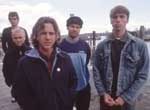
“When did Pearl Jam become classic rock?” my girlfriend asked as we were driving outside Washington, D.C. We’d been listening to what seemed like a continuous loop of the band’s hits on DC-101, a station better known for a rotating playlist of Zeppelins, Van Halens, and Allmans.
Not so long ago, Pearl Jam were viewed as the antithesis of such conservatism, not to mention as a band that would stop at nothing to undercut that kind of ubiquity. They postponed tours to crusade against Ticketmaster, stepped away from the spotlight to back Neil Young, and shunned a megahit future by releasing the purposefully noncommercial No Code and Yield. But even when Eddie Vedder was the cover boy for Time magazine’s 1993 alternative-rock story, the band was churning out classic rock – a marketable mix of guitar heroism and anthemic choruses, albeit with a grungy patina of me-against-the-world angst – dressed in flannel clothing.
After their second album, Vs., Pearl Jam scaled back in both ambition and sound, but their sixth album, Binaural, is a remarkably overt homage to seventies stadium rock, from the pulsing, Who-style bass lines of “Breakerfall,” to the Zeppelin-esque drone of “Evacuation.” Even the swelling orchestrations, tribal thump, and hammy spirituality of “Soon Forget” seem taken from the Doors’ “The End.” Like their various idols, they offer plenty of grandly stated rock-’n’-roll abstractions – “Gods’ Dice” is about Vedder’s fate being held in the hands of the Almighty, dude – but little in the way of self-reflection. Only “Light Years,” Vedder’s lament for a lost love, achieves any emotional resonance.
It’s a shame Pearl Jam is so unexpressive, because the anti-corporate politics of Vedder and his peers that sounded rotely contrarian in the early nineties would seem refreshing during a pop moment so market-driven that the lead singer of Limp Bizkit was named a vice-president of his record label. It might be asking too much for Vedder to reflect on rock the way Neil Young did with “My My, Hey Hey (Out of the Blue),” which connected Johnny Rotten to Elvis Presley and argued that it’s “better to burn out than fade away” – the very inspiration for grunge’s death-before-sellout creed. But couldn’t he at least address the disposability of current pop? Then again, such sentiments wouldn’t do much to get Pearl Jam airplay on DC-101.